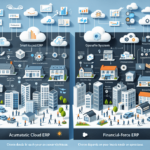Acumatica Cloud ERP vs SAP Business One: A Comprehensive Comparison
Enterprise Resource Planning (ERP) systems have become essential for small and medium-sized businesses (SMBs) across various industries. These systems help streamline processes such as financial management, operations, human resources, and supply chain management. In this article, we provide an in-depth comparison of two leading cloud-based ERP systems, Acumatica Cloud ERP and SAP Business One. We will explore their features, capabilities, pricing, ease of use, implementation timelines, customization options, integration capabilities, customer support, security measures, and user reviews to help you make an informed decision.
Understanding ERP Systems
An ERP system is a comprehensive software solution that integrates various business functions into a unified platform. By consolidating data from different departments, ERP systems enhance visibility, streamline operations, and facilitate informed decision-making. Key benefits include reduced operational costs, improved efficiency, and the ability to scale operations seamlessly as the business grows.
Modern ERP systems cover a wide range of functions, including:
- Financial Management
- Inventory Management
- Human Resources Management
- Customer Relationship Management (CRM)
- Supply Chain Management
By integrating these functions, businesses can optimize their processes, reduce redundancies, and increase overall productivity.
According to a Gartner report, the global ERP market is expected to grow by 7% in 2023, highlighting the increasing reliance on these systems for business success.
Acumatica Cloud ERP vs SAP Business One: An Overview
What is Acumatica Cloud ERP?
Acumatica Cloud ERP is a cloud-based business management system designed for SMBs. It offers a wide range of functionalities, including financial management, project accounting, CRM, inventory management, and more. Acumatica is known for its flexibility, scalability, and customization options, allowing businesses to adapt the system to their unique needs.
Acumatica provides seamless integration with other business applications, enhancing operational efficiency. Its user-friendly interface and mobile accessibility enable users to access important business information from anywhere, at any time.
What is SAP Business One?
SAP Business One is a comprehensive cloud-based ERP solution tailored for small to mid-sized businesses. It encompasses features such as financial management, inventory control, sales, procurement, production planning, and more. SAP Business One is acclaimed for its robust reporting capabilities and real-time data insights, which empower businesses to make informed decisions based on up-to-date information.
The system is highly customizable, allowing businesses to tailor it to their specific requirements. Additionally, SAP Business One offers a range of add-on modules and integrations, ensuring that the system can grow alongside the business.
Key Features and Capabilities
Acumatica Cloud ERP
- Financial Management: Comprehensive tools for accounting, budgeting, and financial reporting.
- Distribution Management: Efficient handling of inventory, orders, and supply chain operations.
- Project Accounting: Tools for managing projects, including budgeting, tracking, and reporting.
- Customer Management: Integrated CRM for managing customer relationships and sales pipelines.
- Mobile Accessibility: Access the ERP system via mobile devices for on-the-go management.
Acumatica's advanced reporting and analytics provide valuable insights into business performance, while its robust API facilitates seamless integration with other business applications.
SAP Business One
- Financial Management: Tools for financial reporting, budgeting, and asset management.
- CRM: Comprehensive customer relationship management features.
- Purchasing: Efficient procurement management to streamline purchasing processes.
- Inventory Management: Advanced inventory tracking and control systems.
- Production Planning and Control: Tools to manage and optimize production processes.
- Reporting and Analytics: Robust reporting tools for real-time business insights.
SAP Business One's integration capabilities extend to popular third-party applications like Salesforce and Microsoft Office, enhancing its functionality and adaptability.
Pricing and Cost Comparison
Understanding the pricing models of both ERP systems is crucial for budget planning:
- Acumatica Cloud ERP: Offers a subscription-based pricing model starting at approximately $15,000 per year. This model includes unlimited user access, making it cost-effective for larger teams.
- SAP Business One: Typically priced at around $3,600 per user, with additional costs for modules and add-ons. While the initial cost per user may be lower, expenses can accumulate as more features and users are added.
Acumatica's subscription-based model provides flexibility and scalability, allowing businesses to adjust their usage without incurring hefty additional costs. In contrast, SAP Business One's per-user pricing can become expensive for organizations with a large number of users.
For a detailed analysis of ERP pricing, refer to the Capterra comparison of ERP systems.
Ease of Use and Implementation
Both Acumatica and SAP Business One are designed with user-friendliness in mind, but there are differences in their implementation and customization:
Acumatica Cloud ERP
- User Interface: Intuitive and modern interface with easy navigation.
- Implementation Timeframe: Typically faster due to flexible customization options and robust support resources.
- Training and Support: Extensive training materials and responsive customer support help reduce the learning curve.
SAP Business One
- User Interface: Comprehensive but may require more training for non-technical users.
- Implementation Timeframe: Can be longer due to more complex functionality and customization requirements.
- Training and Support: Offers detailed training programs and support services, but may require more resources during implementation.
According to Software Advice, Acumatica is often praised for its ease of use and quicker implementation times, making it a suitable choice for businesses looking to adopt an ERP system swiftly.
Customization and Integration
Customization and seamless integration with existing systems are critical factors in ERP selection:
Acumatica Cloud ERP
- Customization: Highly flexible with extensive customization options to tailor the system to specific business needs.
- Integration: Robust API facilitates integration with a wide range of third-party applications, enhancing overall functionality.
- Scalability: Easily scalable to accommodate business growth and evolving requirements.
SAP Business One
- Customization: Offers customization through add-on modules and extensions, though may be less flexible compared to Acumatica.
- Integration: Supports integration with popular third-party applications like Salesforce and Microsoft Office.
- Scalability: Scalable to meet the needs of growing businesses, with various modules to support expansion.
Both ERP systems provide strong integration capabilities, but Acumatica's open architecture and robust API offer greater flexibility for businesses with specific integration needs.
Customer Support and Security
Customer Support
- Acumatica Cloud ERP: Provides comprehensive support through multiple channels, including email, phone, live chat, and a customer portal. Additionally, Acumatica offers extensive training resources and product education to ensure users can fully leverage the system.
- SAP Business One: Offers support through a knowledge base, implementation services, and ongoing customer support. While SAP provides reliable support, the breadth of resources may require more proactive engagement from the user.
Security
- Acumatica Cloud ERP: Implements robust security measures, including data encryption, access control, and regular backups. Users can customize security settings to define different levels of access for various roles within the organization.
- SAP Business One: Employs a multi-layered security approach, emphasizing data security and compliance. Features include role-based access controls, data encryption, and disaster recovery protocols to protect sensitive business information.
Both systems prioritize security, but Acumatica's customizable security settings provide additional flexibility for businesses with specific security requirements.
User Reviews and Ratings
User feedback is instrumental in assessing the practical performance and satisfaction levels associated with ERP systems:
- Acumatica Cloud ERP: Users frequently commend Acumatica for its flexibility, ease of use, and robust customization options. The system's ability to integrate seamlessly with other applications is also highly praised.
- SAP Business One: Users appreciate SAP Business One for its comprehensive feature set and powerful reporting capabilities. Its scalability and reliability are also commonly highlighted strengths.
According to G2 Crowd, both ERP systems receive high ratings, with Acumatica often leading in categories related to user experience and flexibility, while SAP Business One excels in areas such as functionality and support.
Conclusion
Both Acumatica Cloud ERP and SAP Business One are robust ERP solutions capable of meeting the diverse needs of small to medium-sized businesses. The choice between the two depends on specific business requirements, budget constraints, and desired customization and integration capabilities.
- Choose Acumatica Cloud ERP if:
- You require a highly customizable and flexible ERP system.
- Unlimited user access aligns better with your organizational structure.
- Fast implementation and ease of use are priorities.
- Choose SAP Business One if:
- You need a comprehensive ERP solution with strong financial management capabilities.
- Scalable modules and robust reporting features are essential for your business.
- Integration with widely-used third-party applications is a key requirement.
Before making a decision, it's advisable to conduct a thorough needs assessment and possibly engage in trial periods or demos to evaluate which ERP system best aligns with your business objectives. Additionally, consulting with ERP implementation experts can provide valuable insights tailored to your specific situation.




















